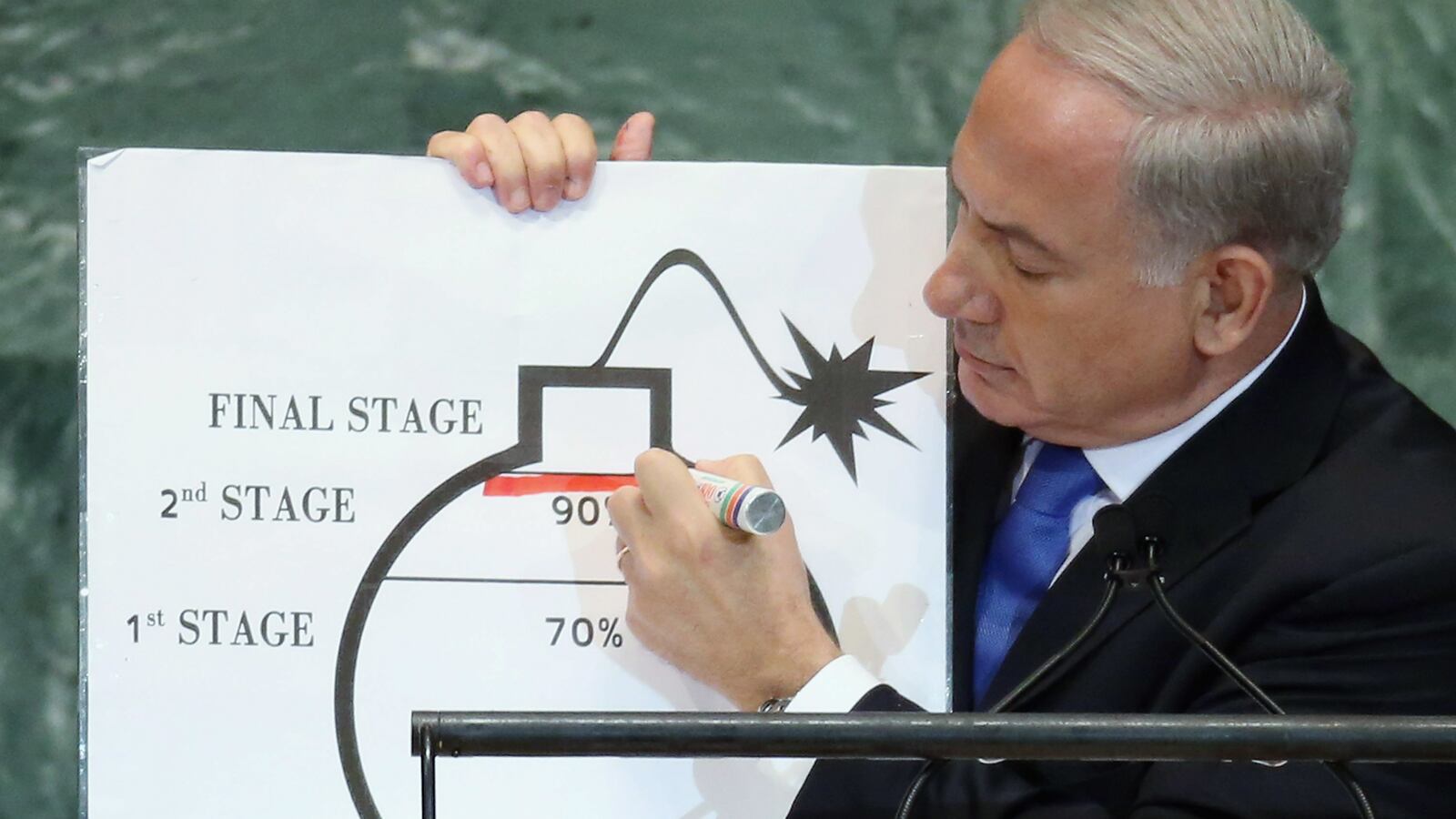A little over a month ago, the average Israeli was suffering from tremendous anxiety. The headlines screamed: tomorrow, in a few hours, the Americans will attack the Syrian chemical weapons program and the Syrians could retaliate against Israel. There were long lines at the gas mask distribution stations.
Just a few months ago, Israeli-Palestinian relations were frozen, with no signs of progress on the horizon. And in June, Mohammed Morsi was still President of Egypt, and Mahmoud Ahmadinejad, who denied the Holocaust and threatened Israel in public, was President of Iran.

Today, thanks to the persistence of Secretary of State John Kerry, we have Israeli-Palestinian negotiations scheduled to last nine months. General Abdel Fattah el-Sisi is leading Egypt, and Hassan Rouhani is President of Iran. Instead of an American attack on Syria, we have a Russian-American agreement, backed by a U.N. Security Council Resolution, to remove chemical weapons from Syria. And we have an Iranian president and an American president talking to each other on the phone for the first time since 1979—a first step toward serious negotiations about the Iranian nuclear program.
Instead of impasse, threats or armed conflict (except for the tragic civil war in Syria), we have diplomacy on the march. This is good for everyone, from Israelis and Palestinians to Egyptians and Iranians.
This also creates a problem for Prime Minister Netanyahu. He has built his career on seeing dangers rather than opportunities at every crossroads. Netanyahu believes history has taught Jews and Israelis that the world is a dangerous place and that we have to be strong and uncompromising in order to survive.
The new situation creates both challenges and opportunities for those of us who want to promote the idea of a Weapons of Mass Destruction (WMD)-Free Zone in the Middle East and a regime of security and cooperation in the region.
With diplomacy on the march, the Israeli government cannot be seen as rejectionist, nor as swimming against the stream. Even Finance Minister Yair Lapid, of the centrist Yesh Atid (There Is A Future) Party, criticized Prime Minister Netanyahu for ordering the Israeli delegation to walk out on President Rouhani's speech at the U.N. The Israeli government will come to feel that it must also make positive contributions to the current climate. President Peres has already suggested that Israel will seriously consider ratifying the Chemical Weapons Convention.
The current situation also creates opportunities for the convening of the Helsinki international conference and moving toward a nuclear-weapon-free zone as mandated by the 2010 NPT (Nuclear Non-Proliferation Treaty) Review Conference.
For any progress to be made, it is absolutely essential that Israel sit down at the negotiating table. Two things that won't help are the following:
a) To ask Israel to sign the NPT at the beginning of the processb) To suggest that Israel should unilaterally give up its nuclear weapons program as a confidence-building measure towards the creation of a WMD-free zone and comprehensive Israeli-Arab peace
There are some very good ideas in the draft paper on “Fissile Material Controls in the Middle East: Steps toward a Middle East Zone Free of Nuclear Weapons and all other Weapons of Mass Destruction,” prepared by Prof. Frank von Hippel, Iranian Ambassador Mousavian and their colleagues at Princeton. From an Israeli perspective, perhaps the most important phrase in the paper is the following:
Any effort to make progress towards a Middle East WMD-free zone must reckon with Israel’s long standing security concerns about its neighbors, the history of covert proliferation efforts in the Middle East and the ongoing dispute over Iran’s nuclear program.
One of the most important outcomes of the NPT Review Conference's 2010 resolution to convene an international conference on a WMDFZ in the Middle East has been the proliferation of regional civil society initiatives, such as the Conference on Security & Cooperation in the Middle East, the Academic Peace Orchestra, the Horizon 2012 Japanese Peace Boat, and the Athens Dialogue.
At the Palestine-Israel Journal we prepared a special issue devoted to 'A Middle East Without Weapons of Mass Destruction' that contains valuable contributions from many of the people involved in these initiatives. It includes the transcript of an unprecedented discussion held in the Knesset's Science and Technology Committee room, featuring a presentation by IPPNW (International Physicians for the Prevention of Nuclear War) Co-President Dr. Ira Helfand on “The Danger of Nuclear Weapons Today and the Implications of a Limited Nuclear War." The discussion was held under the auspices of two Members of Knesset, Tamar Zandberg and Dov Henin.
The main thing is to get Israel to the table. This has to be done with sensitivity and creativity.
One of the potential building blocks for this is the Arab Peace Initiative, launched in 2002 and reconfirmed once again in 2013. What we need is a parallel process, moving toward a WMD-Free Zone and toward comprehensive Israeli-Arab peace and a new regional regime of peace, security and cooperation.
Once Israel is at the table, a process can begin. As someone once said, “Yes we can."
Click here to view the entire panel discussion on YouTube.
Note: This column is based on a presentation given in October at a U.N. panel in New York with Egyptian, Iranian and American panelists.




